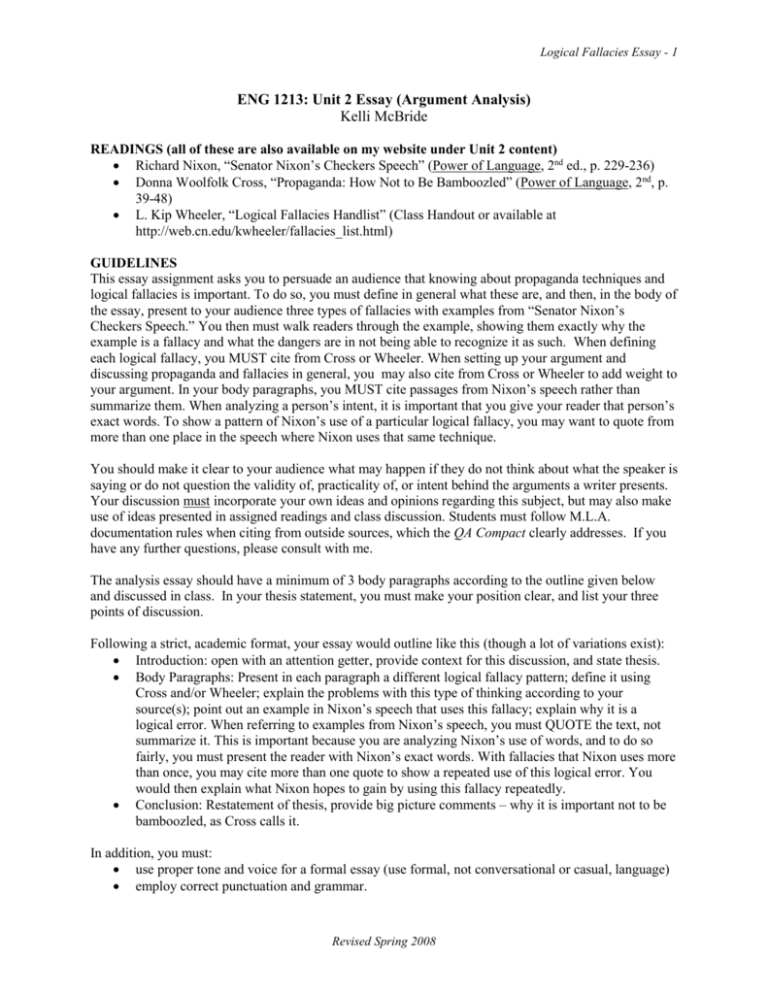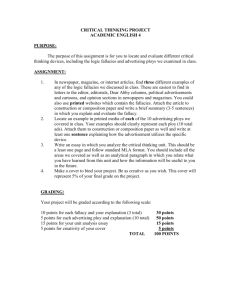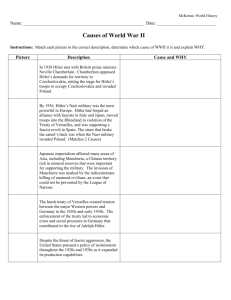Unit Two Essay Handout: Argument Analysis
advertisement

Logical Fallacies Essay - 1 ENG 1213: Unit 2 Essay (Argument Analysis) Kelli McBride READINGS (all of these are also available on my website under Unit 2 content) Richard Nixon, “Senator Nixon’s Checkers Speech” (Power of Language, 2nd ed., p. 229-236) Donna Woolfolk Cross, “Propaganda: How Not to Be Bamboozled” (Power of Language, 2nd, p. 39-48) L. Kip Wheeler, “Logical Fallacies Handlist” (Class Handout or available at http://web.cn.edu/kwheeler/fallacies_list.html) GUIDELINES This essay assignment asks you to persuade an audience that knowing about propaganda techniques and logical fallacies is important. To do so, you must define in general what these are, and then, in the body of the essay, present to your audience three types of fallacies with examples from “Senator Nixon’s Checkers Speech.” You then must walk readers through the example, showing them exactly why the example is a fallacy and what the dangers are in not being able to recognize it as such. When defining each logical fallacy, you MUST cite from Cross or Wheeler. When setting up your argument and discussing propaganda and fallacies in general, you may also cite from Cross or Wheeler to add weight to your argument. In your body paragraphs, you MUST cite passages from Nixon’s speech rather than summarize them. When analyzing a person’s intent, it is important that you give your reader that person’s exact words. To show a pattern of Nixon’s use of a particular logical fallacy, you may want to quote from more than one place in the speech where Nixon uses that same technique. You should make it clear to your audience what may happen if they do not think about what the speaker is saying or do not question the validity of, practicality of, or intent behind the arguments a writer presents. Your discussion must incorporate your own ideas and opinions regarding this subject, but may also make use of ideas presented in assigned readings and class discussion. Students must follow M.L.A. documentation rules when citing from outside sources, which the QA Compact clearly addresses. If you have any further questions, please consult with me. The analysis essay should have a minimum of 3 body paragraphs according to the outline given below and discussed in class. In your thesis statement, you must make your position clear, and list your three points of discussion. Following a strict, academic format, your essay would outline like this (though a lot of variations exist): Introduction: open with an attention getter, provide context for this discussion, and state thesis. Body Paragraphs: Present in each paragraph a different logical fallacy pattern; define it using Cross and/or Wheeler; explain the problems with this type of thinking according to your source(s); point out an example in Nixon’s speech that uses this fallacy; explain why it is a logical error. When referring to examples from Nixon’s speech, you must QUOTE the text, not summarize it. This is important because you are analyzing Nixon’s use of words, and to do so fairly, you must present the reader with Nixon’s exact words. With fallacies that Nixon uses more than once, you may cite more than one quote to show a repeated use of this logical error. You would then explain what Nixon hopes to gain by using this fallacy repeatedly. Conclusion: Restatement of thesis, provide big picture comments – why it is important not to be bamboozled, as Cross calls it. In addition, you must: use proper tone and voice for a formal essay (use formal, not conversational or casual, language) employ correct punctuation and grammar. Revised Spring 2008 Logical Fallacies Essay - 2 follow page format guidelines as described in your syllabus. Include a signed checklist with each draft submitted for a grade Your default audience for this assignment consists of intelligent, college-level readers. You may specify a more particular audience, using examples that will resonate with them. Your paper must be at least 2 pages in length (@600 words). ADDITIONAL You may make an appointment with me (or email me) at any phase of your assignment to discuss any ideas or problems you may be having. I am more than willing to look at drafts at any stage of development. Please consult the information in your syllabus about scheduling appointments in order to do so. You may also schedule an appointment in SSC’s Student Success Center with a writing tutor to gain valuable feedback on your draft. THIS ASSIGNMENT IS WORTH 100 POINTS. Sample analysis of Hitler: introduction, 1 body paragraph, and a conclusion Sophistry happens when people argue through deceit to gain their audience’s support. Sophists believe that any means justifies their ends. Adolph Hitler’s manifesto, Mein Kampf, is perhaps one of the best examples of sophistry. Page after page, Hitler subjects his readers to slights of hand, innuendo, scare tactics, and generalizations. For those who raise a skeptical eyebrow to his arguments, Hitler expounds that most of us are blind to the obvious truths residing beneath our noses. Cleverly, he tries to make us believe that those who do not agree with him are at fault and deluded. Hitler’s arguments rely solely on the readers’ gullibility and acceptance of his points at face value. However, he was able to sway millions of people to his cause. Not all of them were evil or insane. Probability suggests that most of the men and women who helped Hitler murder and torture millions of people were just as sane as you and I. At best, these people were dupes, totally taken in by Hitler’s theory of race and nation. Critical readers of Mein Kampf, though, will see the patterns of logical errors that should have made people at least ask for more evidence. One of Hitler’s more glaring errors in logic is begging the question. Donna Woolfolk Cross says this type of fallacy occurs “when, in discussing a questionable or debatable point, a person assumes as already established the very point that he is trying to prove” (45). The danger with this fallacy is that people will assume that the speaker is basing his argument on something that is true rather than questioning his original premise. Perhaps Hitler’s strongest use of this error involves his theory of race superiority. He posits that inferior races will always drag down and destroy cultures and nations (447). That is why they must be destroyed – to preserve the state (447-48). However, Hitler never identifies what makes a superior race. At no time does he list the qualities that distinguish one from the other, so the audience cannot determine which cultures he is referring to historically. Instead, Hitler makes general and unverifiable statements about these superior races that were infected by racial impurity: “Everything we admire on this earth today—science and art, technology and inventions—is only the creative product of a few peoples and originally perhaps of one race…All great cultures of the past perished only because the originally creative race died out from blood poisoning” (448). The very lack of specific detail is always a good indicator that something is fishy. If a writer cannot back up his/her statements Revised Spring 2008 Logical Fallacies Essay - 3 with proof, then the reader should assume that such proof might not exist. In this instance, the problem is that Hitler tries to build his entire premise of racial purity on this vague historical evidence, which should then beg the questions: What proof can he offer that these events did happen? What evidence can he give that all positive and admirable achievements came from just one group? Obviously, when people ask these questions, they should begin to see that his argument cannot possibly be proven, for no one group is responsible for all beneficial achievements. Any one of these errors should have made more people stop and question Hitler’s entire manifesto. When we add to them the hundreds of other problems with Mein Kampf, we might find it difficult to understand how the Nazi party could have fooled so many people. Of course, Hitler was not the only force at work in Germany at this time. Economical and political concerns also contributed to his rise in power. Still, we cannot deny the implausibility of his arguments. Perhaps we will never stop asking ourselves how he gained such control over Germany for the answer is salvation to us all. We are all susceptible to this type of manipulation because we want people to tell us what we want to hear. A candidate can say, “I won’t raise taxes,” and we want so much to believe that we will buy into it. The lengths we will go to for that candidate depend on his/her persuasive abilities. Someone with the charisma of Hitler can go far on the backs of unhappy and oppressed citizens. Our only defense against such attacks is our analytical mind. We must never take something at face value. Thoreau said that mindless automatons are the tools of evil men. He was specifically speaking of soldiers who obey and ask questions later, if at all, but we can apply the reasoning to anyone willing to support and serve another. Only through vigilance can we maintain freedom. The moment we stop thinking, stop asking, and let things slide is the moment that we surrender our control and become the puppets for others. Works Cited Cross, Donna Woolfolk. “Propaganda: How Not to Be Bamboozled.” Isaacs et al 39-47. Hitler, Adolf. “On Nation and Race.” Isaacs et al 445-50. Isaacs, Jessica, eds., et al. The Power of Language; The Language of Power. 2nd ed. Boston: Pearson Custom, 2006. Revised Spring 2008







